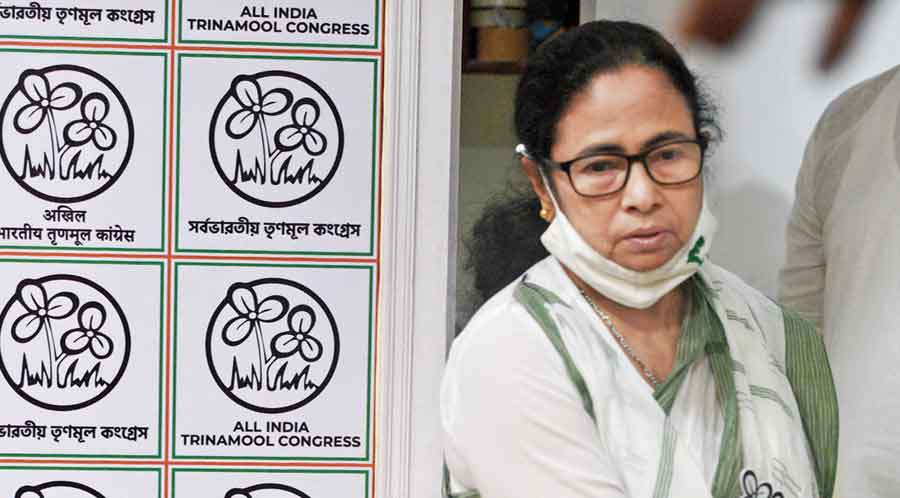Mamata Banerjee said on Friday that finalising the list of candidates was “difficult” in the backdrop of a sudden change in Bengal’s political landscape because of “caste and community considerations” because of the BJP’s divisive politics.
The statement lends credence to the hypothesis that caste-based identity politics will play a key role in determining the outcome of the 2021 Assembly polls.
“Preparing the list of candidates is difficult. Not only do you have to strike a balance between the new and the old…. One has to keep in mind the caste and community considerations, which didn’t exist earlier. The BJP’s divisive politics has brought this change,” said Mamata while releasing the party’s list of candidates for the upcoming Bengal Assembly polls.
“We have to think about minorities, SCs, STs…. Also we have to ensure representation of women,” she added while rolling out the list of factors that were considered to select the list of candidates.
Multiple sources in Trinamul said that navigating through the new realities of poll arithmetic was a challenge for the Trinamul leadership since the 2019 Lok Sabha election results revealed the change in the rules of the game in Bengal, where 34 years of Left rule had reduced the relevance of caste and community questions.
Over the past one-and-a-half years, Trinamul has tried to match the BJP’s might in this game of identities, primarily with the expertise of poll consultant Prashant Kishor, whose team apparently played a key role in drawing up the first draft of the list of candidates based on local inputs and caste and community considerations.
The proof of the effort was visible in the list that had 79 SC candidates — 11 more than the number of reserved seats for the community — and 17 ST, one more than the mandatory fielding of tribal nominees in 16 reserved seats. Besides, the Trinamul list had 42 Muslim candidates and 50 women nominees.
Some party insiders said fielding so many SC candidates and betting on Santhali actress Birbaha Hansda, from an unreserved seat like Jhargram were smart moves against the backdrop of the party’s plan to woo the two communities ahead of the polls.
In the Lok Sabha polls, the BJP’s lead in 34 and 13 Assembly segments out of 68 and 16 seats reserved for SC and ST communities, respectively, became game changer for the party.
“The leads from these Assembly segments were so big that at least four BJP nominees became MPs…. So, the focus this time was to ensure proper representation of the SCs and STs,” said a source.
According to him, Birbaha was fielded from an unreserved seat to send a message to the tribal people. As Birbaha’s election is on the first day of poll, the party will use her in remaining phases for campaigning in tribal pockets across Bengal, the source added.
“The effort is visible as the list has four Namo Shudra candidates, which is aimed at wooing Matua voters, who had swung big time in favour of the BJP in the Lok Sabha polls,” said another source.
The party has fielded Rajesh Lakra, a pastor with a significant following among the tribal community in north Bengal, from Madarihat in Alipurduar. Keeping with the identity theme, Trinamul has left the three hill seats vacant for “friends”, which mean that Mamata is keen on getting Gorkha Janmukti Morcha nominees for the seats to address the identity issue in the hills.
CM the last word
Sources aware of the strategising in Trinamul on candidate list said though Team PK got the inputs from the ground level and the first draft of candidates was drawn up based on these feedback, Mamata gave the final verdict whenever there were differences.
To elaborate on how Mamata prevailed over others about the candidate list, a source referred to the selection of Kajol Sinha to contest from Kahrdah, a seat won by Amit Mitra in 2011 and 2016. Though the party had plans to field someone else as Mitra hasn’t been physically fit, Mamata insisted on Sinha and got him included.
“The party is on a firm footing in Khardah and so she wanted to put up a political candidate there,” said political scientist Biswanath Chakrabory.
In neighbouring Barrackpore, where the Trinamul was lagging behind the BJP in the last Lok sabha polls, she, however, put Tollywood film maker Raj Chakraborty to try and wrest the seat with their star appeal. Selection of Sayantika Bandyopadhyay from Bankura and Sayani Ghosh from Asansol South was also driven by the same logic.
Another important feature of the candidate list was Mamata’s strategy of ring-fencing potential defectors to the BJP with nomination. Inclusion of long-time councillors like Atin Ghosh and Debasish Kumar on the candidate list was aimed at preventing their switch to the saffron camp, said Chakraborty.
“These two leaders were holding discussing with the BJP… Mamata retained them in the party’s fold with nomination,” he explained.











